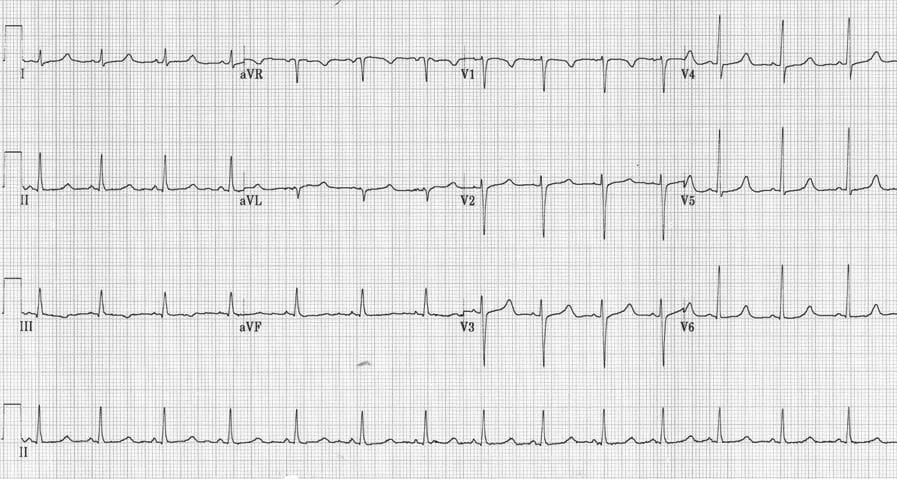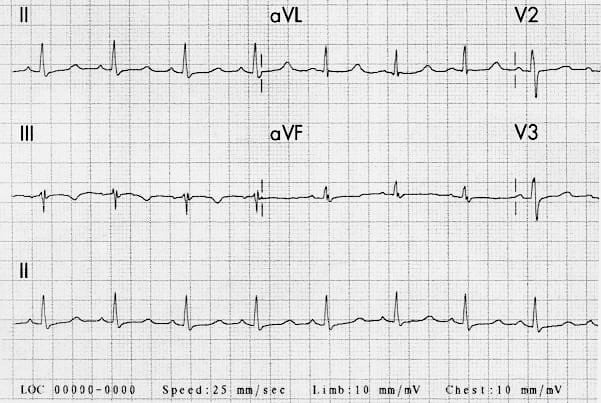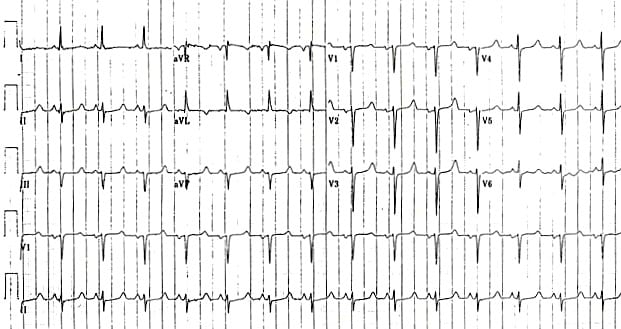Hypocalcaemia
ECG changes in Hypocalcaemia
- Hypocalcaemia causes QTc prolongation primarily by prolonging the ST segment
- The T wave is typically left unchanged
- Dysrhythmias are uncommon, although atrial fibrillation has been reported
- Torsades de pointes may occur, but is much less common than with hypokalaemia or hypomagnesaemia

Hypocalcaemia Overview
- Normal serum corrected calcium = 2.2 – 2.6 mmol/L.
- Mild-moderate hypocalcaemia = 1.9 – 2.2 mmol/L.
- Severe hypocalcaemia = < 1.9 mmol/L.
Causes of Hypocalcaemia
- Hypoparathyroidism
- Vitamin D deficiency
- Acute pancreatitis
- Hyperphosphataemia
- Hypomagnesaemia
- Diuretics (frusemide)
- Pseudohypoparathyroidism
- Congenital disorders (e.g. DiGeorge syndrome)
- Critical illness (e.g. sepsis)
- Factitious (e.g. EDTA blood tube contamination)
Symptoms of Hypocalcaemia
- Neuromuscular excitability
- Carpopedal spasm
- Tetany
- Chvostek sign
- Trousseau sign
- Seizures
ECG Examples
Example 1

Hypocalcaemia:
- QTc 500ms in a patient with hypoparathyroidism (post thyroidectomy) and serum corrected calcium of 1.40 mmol/L
- Reproduced from Nijjer et al. (2010)
Example 2

Hypocalcaemia:
- QT prolongation in a patient with DiGeorge’s syndrome and serum calcium of 1.32 mmol/L
- Reproduced from Kar et al. (2005)
Example 3

- Hypocalcaemia causing a long QTc (510ms)
Related Topics
References
- Nijjer S, Ghosh AK, Dubrey SW. Hypocalcaemia, long QT interval and atrial arrhythmias. BMJ Case Reports 2010
- Kar PS, Ogoe B, Poole R, Meeking D. Di-George syndrome presenting with hypocalcaemia in adulthood: two case reports and a review. J Clin Pathol. 2005 Jun;58(6):655-7
Advanced Reading
Online
- Wiesbauer F, Kühn P. ECG Mastery: Yellow Belt online course. Understand ECG basics. Medmastery
- Wiesbauer F, Kühn P. ECG Mastery: Blue Belt online course: Become an ECG expert. Medmastery
- Kühn P, Houghton A. ECG Mastery: Black Belt Workshop. Advanced ECG interpretation. Medmastery
- Rawshani A. Clinical ECG Interpretation ECG Waves
- Smith SW. Dr Smith’s ECG blog.
- Wiesbauer F. Little Black Book of ECG Secrets. Medmastery PDF
Textbooks
- Zimmerman FH. ECG Core Curriculum. 2023
- Mattu A, Berberian J, Brady WJ. Emergency ECGs: Case-Based Review and Interpretations, 2022
- Straus DG, Schocken DD. Marriott’s Practical Electrocardiography 13e, 2021
- Brady WJ, Lipinski MJ et al. Electrocardiogram in Clinical Medicine. 1e, 2020
- Mattu A, Tabas JA, Brady WJ. Electrocardiography in Emergency, Acute, and Critical Care. 2e, 2019
- Hampton J, Adlam D. The ECG Made Practical 7e, 2019
- Kühn P, Lang C, Wiesbauer F. ECG Mastery: The Simplest Way to Learn the ECG. 2015
- Grauer K. ECG Pocket Brain (Expanded) 6e, 2014
- Surawicz B, Knilans T. Chou’s Electrocardiography in Clinical Practice: Adult and Pediatric 6e, 2008
- Chan TC. ECG in Emergency Medicine and Acute Care 1e, 2004
LITFL Further Reading
- ECG Library Basics – Waves, Intervals, Segments and Clinical Interpretation
- ECG A to Z by diagnosis – ECG interpretation in clinical context
- ECG Exigency and Cardiovascular Curveball – ECG Clinical Cases
- 100 ECG Quiz – Self-assessment tool for examination practice
- ECG Reference SITES and BOOKS – the best of the rest
ECG LIBRARY
Emergency Physician in Prehospital and Retrieval Medicine in Sydney, Australia. He has a passion for ECG interpretation and medical education | ECG Library |
MBBS DDU (Emergency) CCPU. Adult/Paediatric Emergency Medicine Advanced Trainee in Melbourne, Australia. Special interests in diagnostic and procedural ultrasound, medical education, and ECG interpretation. Co-creator of the LITFL ECG Library. Twitter: @rob_buttner


[…] Pic taken from https://litfl.com/hypocalcaemia-ecg-library/ […]